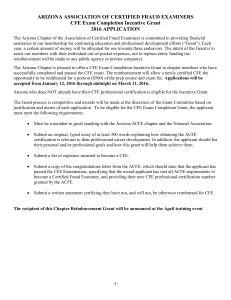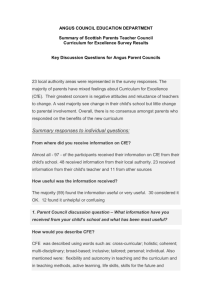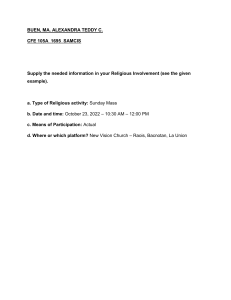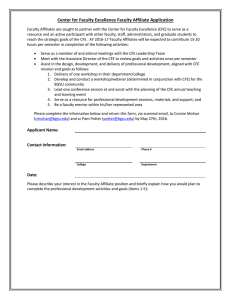Certified Fraud Examiner (CFE) - Law CFE Law Real Questions
advertisement
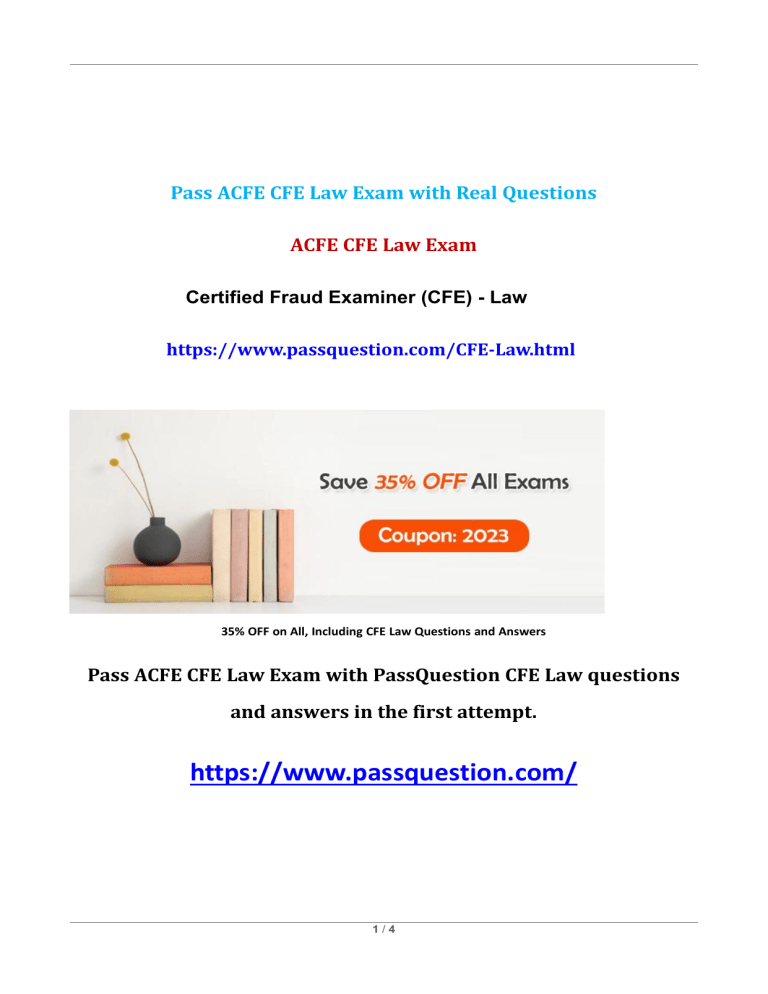
Pass ACFE CFE Law Exam with Real Questions ACFE CFE Law Exam Certified Fraud Examiner (CFE) - Law https://www.passquestion.com/CFE-Law.html 35% OFF on All, Including CFE Law Questions and Answers Pass ACFE CFE Law Exam with PassQuestion CFE Law questions and answers in the first attempt. https://www.passquestion.com/ 1/4 1.Claude stole a large amount of cash from his employer and then deposited the funds into a domestic bank account Next, he wired the illicit funds to a foreign bank account and engaged m several other transactions using foreign accounts to make them difficult to trace Finally, he transferred the funds back to a domestic account and then spent the money. Which of the following actions was the layering stage of Claude's money laundering scheme? A. When he first deposited the funds into a domestic account B. When he first stole the cash from his employer C. When he moved the funds through several transactions using foreign accounts D. When he spent the money Answer: C 2.Countries A and B both follow the Financial Action Task Force (FATF) Recommendations concerning cross-border transfers of currency Trevor is traveling from Country A to Country B while carrying $16,000 in cash which exceeds Country B's reporting threshold Trevor is required to disclose the amount of currency he is carrying to authorities in Country B. A. True B. False Answer: A 3.Which of the following situations would constitute a violation of the US Foreign Corrupt Practices Act (FCPA) A. A private U.S company pays a S2.000 foreign corporation fee that is required in order to do business within the country B. A private UK company transfers $25,000 to a Chilean public official to influence the award of lucrative overseas contracts. C. A private U S company transfers $45,000 to a foreign official to influence the award of a public construction contract. D. A private U.S company transfers $100,000 to the sole proprietor of a Brazilian company to influence the award of a commercial imports contract. Answer: C 4.The Organisation for Economic Co-operation and Developments (OECD) Recommendation on Combating Bribery m International Business (Recommendation) urges member states to combat the bribery of foreign public officials by taking steps to improve which of the following primary areas within their respective infrastructures? A. Public health and safety regulations B. Laws and regulations related to public subsidies licenses, and contract procurement C. Laws and regulations covering e-commerce D. Consumer data protection laws Answer: B 5.The MAIN PURPOSE for maintaining the chain of custody on an item of evidence is to A. Establish that the evidence has not been altered or changed from the time it was collected through its production in court 2/4 B. Verify that the item of evidence has only been handled by court officials prior to its production m court. C. event opposing parties from accessing evidence without a court order D. Eliminate re need to authenticate the item of evidence in court Answer: A 6.Smith, a Certified Fraud Examiner (CFE). works for the ABC Company, a private entity that operates w\ a jurisdiction with civil laws for defamation, invasion of privacy. and conflict of interest Smith seizes and searches the personal smartphone of Green an employee of ABC even though Green was not suspected of any wrongdong Assuming that Green had a reasonable expectation of privacy in the smartphone and Smith conducted the search without a legitmate interest or authority, under which of the following claims would Green MOST LIKELY be able to recover damages against Smith? A. Slander B. Intrusion into Green's private matters C. Public disclosure of private facts D. Conflict of interest Answer: B 7.Which of the following is NOT one of the elements that the government must prove to establish a violation of a law criminalizing false statements to government agencies? A. The government relied on the false statement B. The defendant knew the statement was false C. The defendant made a false statement D. The false statement was material Answer: A 8.In jurisdictions that allow for corporate criminal liability which of the following is typically required for the corporation to be vicariously liable for the acts of one of its employees? A. Management was directly involved with the offense B. Management knew of the underlying offense but did not correct it C. The corporation had previous violations of a similar nature D. The employee was acting within the scope of their employment Answer: D 9.Which of the following can affect the rights that employees may have during an internal investigation? A. Existence of fraud risk factors B. Existence of violation red flags C. Existence of interstate compacts D. Existence of an employment contract Answer: D 10.The MOST COMMON bankruptcy fraud scheme is: A. Forged filing B. A planned bustcut C. A credit card bustout 3/4 D. Concealment of assets Answer: D 11.Which of the following, if available, would help an organization recover losses from an instance of internal fraud? A. Privilege insurance B. Customer liability policy C. Fidelity insurance D. Deposition Answer: C 12.Which of the following is NOT required for a contract transaction or scheme to be classified as an investment contract? A. The expectation of making a profit B. Profits derived solely from the investor's management activity C. investment m a common enterprise D. An investment of money or other asset Answer: B 13.Which of the following is NOT a requirement of the European Union's (EU) General Data Protection Regulation (GDPR)? A. An organization must delete a data subject's personal data automatically when the data are no longer m use. B. An organization must have a documented lawful basis for collecting or processing personal data. C. An organization generally must notify all affected data subjects without undue delay when a high-risk data breach occurs D. An organization must confirm or deny that it possesses a data subject's personal data upon that individual's request Answer: B 14.Which of the following is the MOST ACCURATE statement about the different types of alternative dispute resolution'? A. The agreements reached in mediations are generally nonbinding. B. In a mediation session, the mediator decides who should win the dispute at issue C. The decisions reached in all arbitrations are always binding D. In an arbitration proceeding the arbitrator acts as a judge or jury by deciding the dispute at issue on its merits Answer: D 4/4

